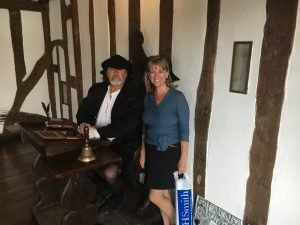Speaking Elizabethan, As One Does
I speak Elizabethan. Okay, imperfectly, and not as a regular thing, and probably it would be more accurate to say that I understand Elizabethan English.
So how did this happen? Was it gained through hours and hours of graduate-level work, resulting in an obscure degree?
Nope.
(Although I do have a VERY obscure advanced degree, and some day I can tell you all about it.)
I learned to understand the English of Shakespeare as a kid, in the way kids learn any language: by being immersed in it. My dad was a high school English teacher who wanted to become better educated in his Shakespeare. Thus, when I was a baby, he and my mom began an every-summer habit of taking the fam to Ashland, Oregon to watch plays.
(Or, as the Elizabethans would have said, to “hear” plays.)
For several years, that meant date night(s) for my parents while my grandparents watched me and my younger sister. Children had to be five years old to attend performances. Mom and Dad waited for my younger sister to collect the correct number of birthdays, and thus I was newly seven by the time I attended my first Shakespeare play.
Do you know what seven-year-olds are really good at? Language acquisition.

Me, visiting Shakespeare’s ACTUAL school room.
In my case, I was a LANGUAGE-OBSESSED child. I loved words. I loved sentences. I loved repeating words, memorizing things, trying on new accents – “Words, words, words,” to borrow from a sad Danish prince given to monologuing.
For instance, when I was two, I learned that you could express the concept of “two-ness” in three distinct ways. You could hold up two fingers in answer to the question “How old are you?” Or you could spell it using sounds (tea-double you-oh). Or you could speak the word “two.” I have a memory of walking down the hallway repeating “t-w-o” over and over, just waiting for someone to ask me how old I was.
Anyway, back to being seven and going to a play for the first time.
Now, if I’m honest, I don’t know if I saw Rosencrantz and Guildenstern are Dead first or The Merchant of Venice. We watched both that fateful summer. But if you know the Stoppard play (R&G), you know his language is extremely complex, and at times, Elizabethan. It was basically like seeing 2 plays in this new language.
I. Was. Smitten.
I had not been told ahead of time that Shakespearean dialogue was challenging. Of course, when you’re seven, all adult conversation is challenging. So I just leaned forward (careful not to touch the wimples of the nuns seated in front of me even though I REALLY wanted to) and listened.
Intensely listened.
IIRC, my sister fell asleep, but me? I was there for it! And when Portia and Nerissa told their betrotheds a Big Fat Lie, I was there to call them on it.
Literally.
I said, “Liar” from my back-row seat in the Angus Bowmer Theater, which for its time was innovative in how it allowed small sounds to travel great distances.
First the nuns in front of me tittered. One turned and smiled, so I figured I wasn’t in too much trouble? Then the next row started laughing, and the next, and next, in this speedy ripple of laughter that made it all the way to the stage.
At this point, the actors broke character. They started laughing, leaned down, braced their hands on their tights-clad thighs, and laughed. My parents were too mortified (amused? shocked?) to say anything to me.
The actors collected themselves and the scene continued.
As an adult reader of Shakespeare, I have searched for the line that says, “We’ve been faithfully staying at home praying for your return,” but that line, as such, doesn’t exist. Which means I was relying on context to understand what was going on, and who was fibbing.
From that summer forward, I BEGGED my parents to take us back for more Shakespeare. I watched plays on TV. I found the volumes of Shakespeare in the Great Books of the Western World collection and started reading. The spelling! The language! The everything!
All this to say, if you have ever noted the little nods to the bard in every novel I write, now you know where it all started….
Recently, I got to enjoy my favorite day, a recurring day that only happens once every two years. (Very Marsian, right??)
On this Day of Days, I get to deliver the All About Will Shakespeare lecture, providing students some context for the cultural setting of his plays. I always include ask-me-anything time because it is fun to see if the students can stump me! (It’s rare and thrilling when it happens, because it is essentially permission to do MOAR RESEARCH. Special interests, baby!)
So there you have it: the story of Cidney and the New Language. Btw, if you’re a language/word/bard nerd too? I need to know this!
For now, to tweak a quote from the conclusion of a play I love: “[I] this way, you that.”
Do you know which play it’s from?



